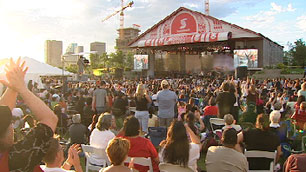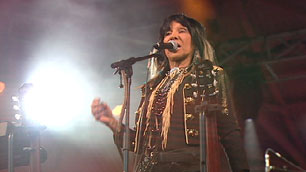CBC News
June 18, 2010
http://www.cbc.ca/canada/manitoba/story/2010/06/17/mb-truth-reconciliation-fraudulent-protestor-winnipeg.html
The sun rises over the site of the Truth and Reconciliation Commission hearings at The Forks in Winnipeg. (CBC)
As the Truth and Reconciliation Commission heard from residential school survivors on the second of four days of hearings in Winnipeg Thursday, one woman criticized the commission for not allowing the people testifying to name names.
Louise Halama has been handing out pamphlets at The Forks national historic site, where the commission's first national event is being held June 16-19.
The pamphlets question the legitimacy of a truth and reconciliation process that doesn't allow people to identify the people who mistreated them, calling the process "fraudulent."
The hearings are intended as an opportunity for former students, staff and others whose lives have been affected by the residential school system that existed in Canada for more than 100 years to talk about the experience publicly.
The event is the first of seven planned across the country.
About 150,000 First Nations, Metis and Inuit children were placed in more than 130 government-funded, church-run schools across Canada from the late 1870s until the last school closed in 1996.
The schools were meant to force the assimilation of young aboriginal people into European-Canadian society. Many students were forbidden to speak their native languages or otherwise engage in their culture at the schools.
Some were physically, sexually and psychologically abused at the schools.
No names named at public hearings
 |
| A crowd gathers at The Forks to watch a free concert featuring Blue Rodeo, Joey Stylez, Buffy Sainte-Marie and others marking the start of hearings about Canada's residential school system.A crowd gathers at The Forks to watch a free concert featuring Blue Rodeo, Joey Stylez, Buffy Sainte-Marie and others marking the start of hearings about Canada's residential school system. (CBC) |
The commission, which was set up in 2008 but only began operating this year, has asked survivors who are telling their stories not to name those who have abused them.
If they do, the public will be barred from the tent where the stories are being heard.
If a story is being told in a private setting and being recorded, the names of any alleged abusers will not be made public.
The only exception is if the person has already been convicted of committing that abuse.
The commission says that was agreed to by former students ahead of the hearings.
"So far … people have been very respectful of that and, actually, in a lot of the private statements, too. We don't find that it's a major issue at all," said Ry Moran, director of statement gathering for the commission.
If former students have knowledge of specific criminal offences committed against them or others, they should go to police, said Indian Affairs Minister Chuck Strahl, who attended the launch of the hearings on Wednesday.
He said the commission's rules were created for good reason.
"This is not a court of law," he said. "It's not intended to be. But certainly, if people have evidence of criminal activity they want to bring forward, they should bring it to the proper authorities."
Halama isn't satisfied with that and is forming a new group for survivors, with a first meeting scheduled to take place later this month.
Concert kicks off 4-day event
The first day of hearings Wednesday began with stories and drumming and ended with song.
 |
| Buffy Sainte-Marie performs at a free concert launching the first national event of the Truth and Reconciliation Commission.Buffy Sainte-Marie performs at a free concert launching the first national event of the Truth and Reconciliation Commission. (CBC) |
"We are doing these things here today and for the rest of this week and for the term of the commission for one simple reason: the truth eventually will heal us all," Justice Murray Sinclair, the Manitoba judge who is chairing the commission, told a crowd of several hundred people during his opening address.
"Our goal is to lay the groundwork that will help us close the divide between aboriginal people and the rest of Canadians."
The day concluded with a free concert that included performances by Blue Rodeo, Joey Stylez and Buffy Sainte-Marie.
Residential school survivor Lyle Wasteste said he found Sainte-Marie's performance of a song about residential schools especially moving.
"It's good to know we're all not alone," he said.
Another free concert will take place Friday.
It is expected that more than 5,000 people, including former students, leaders of aboriginal organizations, church groups and members of the public, will attend the hearings over the course of four days.
Any original material on these pages is copyright © BishopAccountability.org 2004. Reproduce freely with attribution.